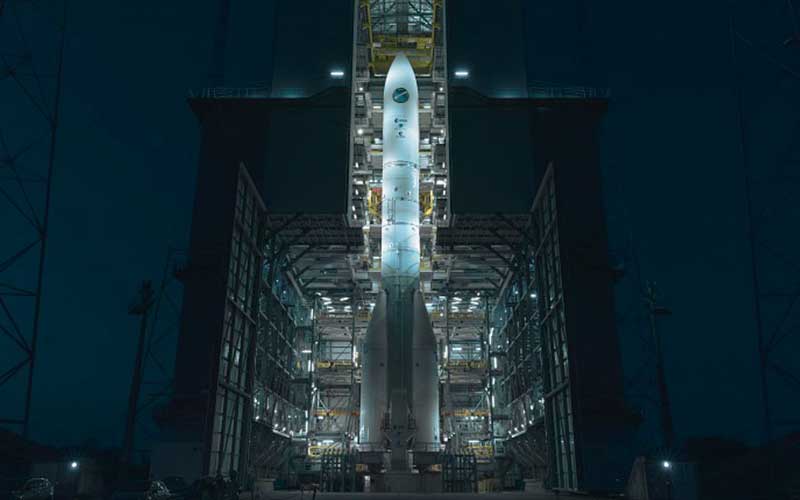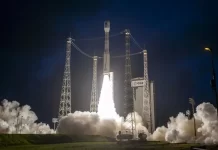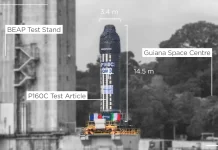
Arianespace has announced that it will not attempt the second flight of its Ariane 6 rocket in 2024, with the launch now pushed to no earlier than February 2025.
Ariane 6 was launched for the first time in July 2024. While the flight was labeled a success by Arianespace, an anomaly during the flight prevented the final firing of the rocket’s upper stage engine. Despite the anomaly, Arianespace CEO Stéphane Israel confirmed in a post-flight press conference that the anomaly would have “no consequence” on future launches and that the company was “perfectly on track to make the second launch this year.”
The next Ariane 6 flight will see the rocket carry the CSO-3 spy satellite into orbit for the French armed forces. The satellite will be launched aboard an Ariane 62 rocket, which features two P120C solid-fuel boosters.
In an 8 November press release, Arianespace announced that several factors had contributed to the next Ariane 6 flight slipping from late 2024 to the first quarter of 2025.
According to the launch provider, despite the data collected during the maiden flight confirming “the excellent behavior and performance of Ariane 6,” there had been “a small number of deviations.” The most prominent “deviation” was the malfunctioning APU, which had been identified as the cause of the inaugural flight’s anomaly.
The APU pressurizes the rocket’s upper stage tanks, enabling in-orbit ignition of the rocket’s Vinci upper stage engine. According to Arianespace, a “software correction” has been implemented to ensure the APU operates as expected.
While not included in the Arianespace press release, European Test Services (ETS) announced on 8 November that the rocket’s upper stage has also completed acoustic reverberation testing in ESA’s Large European Acoustic Facility in the Netherlands. According to the ETS announcement, the successful completion of the test campaign “supports the further development of Ariane 6 following its inaugural flight.”
In addition to the adjustments to the rocket’s upper stage, the company cited launcher production and the handover of the Ariane 6 launch complex as the primary reasons for the delay. However, why these two factors contributed was not detailed.
According to Arianespace, the main stage and upper stage for the flight have been integrated and will shortly be moved from ArianeGroup’s production sites in Les Mureaux and Bremen to the launch site in French Guiana. While transport, unloading, preparation, transfer, verticalization, and integration of the different components of the rocket will undoubtedly take more than a month and a half, it’s unclear what has changed since July that has delayed production of these components. This is especially true for the rocket’s main stage which appeared to have performed flawlessly, requiring no updates from the first to second flights.
Similarly, the transfer of the Ariane launch complex to Arianespace and ArianeGroup has, according to the Arianespace announcement, been completed. So, why has this been identified as a reason for the launch being delayed by several months? Was the transfer delayed and did this affect the preparations of ground systems for the upcoming flight?
According to Arianespace, while these factors have delayed the second flight of Ariane 6, scheduled dates for all other flights previously slated to take place in 2025 remain unchanged. This is, however, hard to take at face value, given the company’s previous guarantees.




